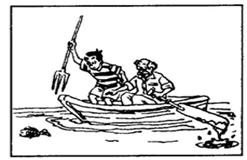综合问答—叉鱼过程中的物理: 炎热的夏天,小雨和爷爷划船到湖中叉鱼,请你挑选2个场景,用所学的物理知识注行解释:

①感觉在湖中比在岸上凉爽;②划船时,手移动较小的距离,船桨在水中移动较大的距离;③向后划水,船向前进;④叉鱼时,瞄准看到的鱼的下方才能叉到鱼。
(1)解释场景: (2)解释场景
解释场景①:(根据公式 可知)在质量和吸放热相同时,比热容大的物质温度变化少。水和泥土相比,水的比热容较大,在同样受热时,温度升高得较少,所以感觉在湖中比在岸上凉爽。
可知)在质量和吸放热相同时,比热容大的物质温度变化少。水和泥土相比,水的比热容较大,在同样受热时,温度升高得较少,所以感觉在湖中比在岸上凉爽。
解释场景②:使用费力杠杆可以省距离。船桨是费力杠杆,划船时,手加在船桨上的动力比水对船浆的阻力大,所以手只要移动较小的距离,就能使船桨在水中移动较大的距离。
解释场景③:物体间的作用力是相互的。向后划水时,给了水一个向后的力,同时水给船一个向前的力,因此船向前进。
解释场景④:这是光的折射现象。人在空气中看水中的鱼时,水中鱼反射的光从水中斜射到空气中发生折射,折射光线远离法线进入人的眼中,人逆着折射光线看到的是变浅了的鱼的虚像,真正的鱼在它的下方,所以插鱼时,只有瞄准看到的鱼的下方才能插到鱼。
泥土烫,海水凉,是和物体的比热容有关,水的比热容比土的比热容大,在同样的日照条件下,吸收相同的热量,水的温度变化小,土的温度变化大,所以水凉,土烫;
用船桨划水时,动力臂小于阻力臂,所以船桨属于费力杠杆,费力但省距离;
用船桨向后划水时,船桨给水一个向后的力,由于物体间力的作用是相互的,所以水也给船桨一个向前的力,这个力就是船前进的动力.
因为光的折射定律,当从上面看水中的物体时,会感到物体的位置比实际位置高一些,并且物体的光线进入观察者的眼睛,当渔民看水中的鱼时,正是应了这一现象,看到的鱼的位置并不是真正的鱼的位置,而是鱼得虚像;因此在叉鱼时,只有瞄准鱼的下方才能把鱼叉到.
